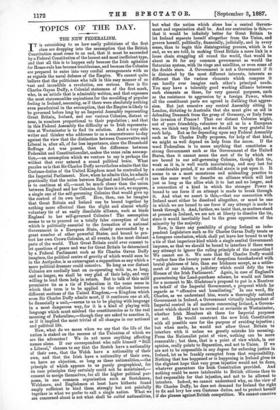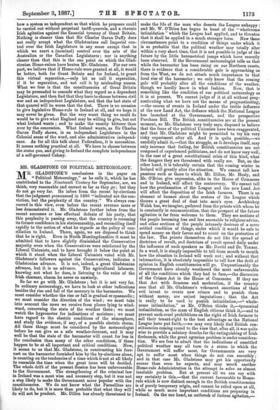TOPICS OF THE DAY.
THE NEW FEDERALISM.
IT is astonishing to us how easily politicians of the first class are dropping into the assumption that the British Constitution must come to an end, that it must be succeeded
by a Federal Constitution of the loosest and most inefficient type, and that all this is to happen only because the Irish agitation for Home-rule has become troublesome, and because the Colonies are prepared to enter into very cordial arrangements with us as regards the naval defence of the Empire. We cannot quite believe that the politicians who talk in this easy manner of so 'vast and incredible a revolution, are serious. Here is Sir Charles Gavan Duffy, a Colonial statesman of the first mark, who, in an article that is admirably written, and that expresses the most statesmanlike aspirations for the moulding of popular feeling in Ireland, assuming, as if there were absolutely nothing even paradoxical in the assumption, that the Empire is likely to be governed before long by an Imperial Assembly representing Great Britain, Ireland, and our venom, Colonies, distant or near, in numbers proportional to their population ; and that in this Federal Assembly the difficulty as to Irish representa- tion at Westminster is to find its solution. And a very able writer and thinker who addresses to us a remonstrance to-day against the view that the distinction between Conservative and Liberal is, after all, of far less importance, since the Household Suffrage Act was passed, than the difference between Federalist and Constitutionalist, makes the same calm =sump- tion,—an assumption which we venture to say is perhaps the wildest that ever entered a sound political brain. What puzzles us is that Sir Charles Duffy nevertheless admits that the Customs-duties of the United Kingdom must be controlled by the Imperial Parliament. Now, when he admits this, he admits practically that the union between England and Ireland,—if it is to continue at all,—must be much closer than the union between England and her Colonies, for there is not, we suppose, a single one of the self-governing Colonies that would give up the control of its own tariff. How, then, can he imagine that Great Britain and Ireland can be bound together by nothing more effectual than the eight and almost wholly voluntary tie of an easily dissoluble alliance, such as binds England to her self-governed Colonies ? The assumption seems to us to proceed on a totally false conception of that which is politically essential to the formation of a national Government in a European State, closely surrounded by a great number of other powerful States, and bound to pro- tect her own Crown Colonies, at all events, in the most distant parts of the world. That Great Britain could ever consent to let questions of peace and war for Great Britain be determined by a Federal Parliament such as Sir Charles Gavan Daffy imagines, the political centre of gravity of which would soon be in the Antipodes, is as extravagant a supposition as any which a mere political dreamer could conceive. So long as our distant Colonies are cordially bent on co-operating with us, so long, and no longer, we shall be very glad of their help, and very willing to lend them help in return. But to talk of this mild permissive tie as a tie of Federalism in the same sense in which that term is to be applied to the relation between different sections of the United Kingdom,—a Kingdom which even Sir Charles Duffy admits must, if it continues one at all, be financially a unit.,—seems to us to be playing with language in a most dangerous way, for it is a kind of playing with language which must mislead the constituencies as to the real meaning of Federalism,—though they are asked to sanction it, as if it implied the most trivial of all changes in our national and political life.
Now, what do we mean when we say that the life of the nation is staked on the success of the Unionism of which we are the advocates? We do not mean anything affecting names alone. If our correspondent who calls himself "Still a Liberal," chooses to say that the Scotch have a nationality of their own, that the Welsh have a nationality of their own, and that the Irish have a nationality of their own, we have no objection, so long as these nationalities,—the principle of which appears to us purely geographical, for on race principles they certainly could not be maintained,— consent to merge themselves, for all the higher political pur- poses, in one common organisation such as Scotchmen, Welshmen, and Englishmen at least have hitherto found amply sufficient to bind them strongly but not painfully together in what we prefer to call a single nation. What we are concerned about is not what shall be called nationalities, but what the nation which alone has a central Govern- ment and organisation shall be. And our contention is this,—
that it would be infinitely better for Great Britain to let Ireland separate herself altogether from the Union, and govern herself, politically, financially, judicially, and in every
sense, than to begin this disintegrating process, which is to end, as we are told, in making Great Britain a mere link in a loose chain straggling all round the world, that would be
about as fit for any common government as would the Saturnian system, with its rings and satellites, or even some of
the double stars. A Government is not a Government if it is distracted by the most different interests, interests so- different that the various elements which compose it can hardly ever imagine each other's principal neede. You may have a tolerably good working alliance between such elements as these, for very general purposes, snob as the resistance to aggression by a foreign Power, when, all the constituent parts are agreed in disliking that aggres- sion. But just conceive any central Assembly sitting in London, dictating to Australia that she must give us aid in defending Denmark from the grasp of Germany, or Italy from the invasion of France? That our distant Colonies might, out of pure friendship, volunteer to aid us in a European war, we think very likely, and we should be very grateful for such help. But as for depending upon any Federal Assembly such as Sir Charles Duffy proposes, for help of that kind, we might as well depend on help from the moon. If the word Federalism is to mean anything that constitutes a. strong Government such as the Government of the United States, then it cannot mean the sort of tie by which we are boned to our self-governing Colonies, though that tie, weak as it is, is well worth maintaining, and may last for a considerable period, if no artificial strain is put upon it. It seems to us a most monstrous and misleading practice to use the same word to describe an alliance which will last jut as long as the allies wish it to last and no longer, and a connection of a kind in which the stronger Power is bound to use force if an attempt is made to break through it. And what we assert is this,—that our connection with Ireland must either be dissolved altogether, or must be one in which we are bound to use force if any attempt is made to break through it. And, further, we insist that, as matters stand at present in Ireland, we are not at liberty to dissolve the tie, since it would inevitably lead to the gross oppression of the minority by the majority.
Now, is there any possibility of giving Ireland an inde- pendent Legislature such as Sir Charles Gavan Daffy treats as a foregone conclusion, which shall yet leave her bound to us by a tie of that imperious kind which a single central Government imposes, so that we should be bound to interfere if there were any attempt to ignore the ruling principle of the connection? We cannot see it. We note that Sir Charles Duffy would "rather face the twenty years of despotism foreshadowed with brutal plainness of late, than see Irishmen accept, as a settle- ment of our claims, a judiciary which could defy the two Houses of the Irish Parliament." Again, in case of England's guaranteeing the Land-purchase scheme, he would not listen for a moment to Mr. Gladstone's proposal to put in a Receiver on behalf of the Imperial Government, a proposal which he regards as "offensive and humiliating." In one word, Sir Charles, as we understand him, wants a thoroughly national Government in Ireland, a Government virtually independent of Imperial control in all matters concerning Ireland, a Govern- ment which should not be revised or revisable at Westminster, whether Irish Members sit there for Imperial purposes or not. He 'would construct the new Irish Constitution with all possible care for the purpose of avoiding injustice ; but when made, he would not allow Great Britain to interfere with it unless we greatly mistake his meaning. From the Nationalist point of view, nothing can be more reasonable ; but then, that is a point of view which, in our opinion, really points to Separation, and not to Union. If we are not to be responsible in any degree for enforcing justice in Ireland, let us be frankly exempted from that responsibility. Nothing that has happened or is happening in Ireland gives us the slightest hope that very gross injustice would not be done, whatever guarantees the Irish Constitution provided. And nothing could be more intolerable to British citizens than to feel responsible for that injustice, and not to be allowed to interfere. Indeed, we cannot understand why, on the view of Sir Charles Duffy, he does not demand for Ireland the right to fix and levy her own Customs duties, and to protect herself if she pleases against British competition. We cannot conceive how a system so independent as that which he proposes could be carried oat without perpetual tariff-quarrels, and a chronic Irish agitation against the financial tyranny of Great Britain. Nothing is clearer than that Sir Charles Gavan Duffy does not really accept what the Gladstonians call Imperial con- trol over the Irish Legislature in any sense except that in which we exert a (nominal) control over the acts of the Australian or the Canadian Legislatures ; nor is anything clearer than that this is the one point on which the Glad- stonian Home-rulers have beaten Mr. Gladstone. For our own part, we believe that if Home-rule were granted at all, it would be better, both for Great Britain and for Ireland, to grant this virtual separation,—only let us call it separation, if it be separation, and not call it by misleading names. What we fear is that the constituencies of Great Britain may be persuaded to concede what they regard as a dependent Legislature, and then find that they have to choose between civil war and an independent Legislature, and that the last state of that quarrel will be worse that the first. There is no occasion to give legislative Home-rule to Ireland at all, and we hope it may never be given. But the very worst thing we could do would be to give what England may be willing to give, but not what Ireland wants ; and to make the enmity bitterer than ever by the concession. What Ireland wants, as Sir Charles Gavan Duffy shows, is an independent Legislature in the Colonial sense of the word, and also administrative independ- ence. As for all this talk about Federalism, it is moonshine. It means nothing practical at all We have to choose between the status quo, and giving to Ireland the complete independence of a self-governed Colony.



































 Previous page
Previous page